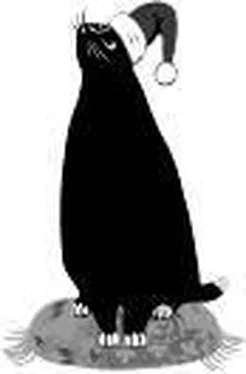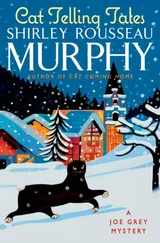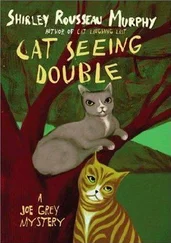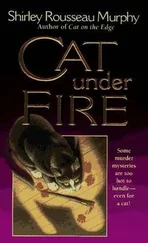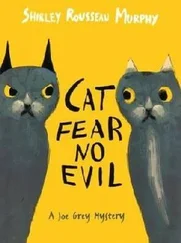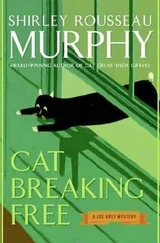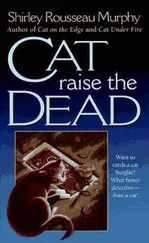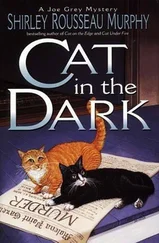Shirley Murphy - Murphy_Shirley_Rousseau_Cat_Coming_Home_BookFi
Здесь есть возможность читать онлайн «Shirley Murphy - Murphy_Shirley_Rousseau_Cat_Coming_Home_BookFi» весь текст электронной книги совершенно бесплатно (целиком полную версию без сокращений). В некоторых случаях можно слушать аудио, скачать через торрент в формате fb2 и присутствует краткое содержание. Год выпуска: 2010, ISBN: 2010, Издательство: HarperCollins, Жанр: Старинная литература, на английском языке. Описание произведения, (предисловие) а так же отзывы посетителей доступны на портале библиотеки ЛибКат.
- Название:Murphy_Shirley_Rousseau_Cat_Coming_Home_BookFi
- Автор:
- Издательство:HarperCollins
- Жанр:
- Год:2010
- ISBN:978-0-06-201838-0
- Рейтинг книги:4 / 5. Голосов: 1
-
Избранное:Добавить в избранное
- Отзывы:
-
Ваша оценка:
- 80
- 1
- 2
- 3
- 4
- 5
Murphy_Shirley_Rousseau_Cat_Coming_Home_BookFi: краткое содержание, описание и аннотация
Предлагаем к чтению аннотацию, описание, краткое содержание или предисловие (зависит от того, что написал сам автор книги «Murphy_Shirley_Rousseau_Cat_Coming_Home_BookFi»). Если вы не нашли необходимую информацию о книге — напишите в комментариях, мы постараемся отыскать её.
Murphy_Shirley_Rousseau_Cat_Coming_Home_BookFi — читать онлайн бесплатно полную книгу (весь текст) целиком
Ниже представлен текст книги, разбитый по страницам. Система сохранения места последней прочитанной страницы, позволяет с удобством читать онлайн бесплатно книгу «Murphy_Shirley_Rousseau_Cat_Coming_Home_BookFi», без необходимости каждый раз заново искать на чём Вы остановились. Поставьте закладку, и сможете в любой момент перейти на страницу, на которой закончили чтение.
Интервал:
Закладка:
Everything had gone so smoothly. Every year at Easter vacation Maudie and Martin and Benny headed for Maudie’s cabin; this year was no different except to add Caroline and her brats. She’d left Vegas with ample time to meet her partner, and then to intercept Maudie’s arrival. Had timed it so well that once she’d picked the padlock, pulled the rental car into the old barn, and hot-wired the truck, they’d had to wait less than an hour on the dark side road until they saw the pale convertible coming, and had eased in behind it. All had gone as planned, it was the weeks following after the shooting that were tedious, fending off the saccharine sympathy of her new neighbors and coworkers, enduring the funeral—oh, she’d gone, all right. Had even managed to squeeze out a few tears. The reading of the will and trust was a shocker, but she should have known he’d waste no time leaving everything to Caroline, Benny, and the old woman.
Some would say she should contest the will and try to break the trust, that she was Benny’s mother and should be the trustee of his share. But under the circumstances, that wasn’t smart. There were other ways to get what was rightfully hers.
And there was more than the will and trust to worry about. It was no secret that after the funeral Maudie cleared out Martin’s and Caroline’s house with the assistance of Caroline’s sister; then Maudie put her own house on the market, preparing to leave L.A. But taking what with her? Caroline’s personal papers? Or did Caroline’s sister have them?
With this in mind, and with apparently no follow-up interest from the law, she’d opted to move away just as the old woman was planning to do. She had told the LAPD detectives that staying in the city was too painful, that she was going down to San Diego for a while, to stay with a friend. Lay a trail on to Mexico for them to find, then turn around and head up the coast instead, where Maudie would soon be living. It wasn’t likely the old woman would imagine she’d come up there to the village, or that she’d maintained her own contacts in Molena Point so well. With Maudie busy getting herself settled, why would she wonder about her ex-daughter-in-law and those old connections, or what use Pearl might make of them? When, later, she opted to contact Maudie and get back her own, wouldn’t that be a nice surprise.
16

JASMINE VINES COVERED the high adobe wall that shielded the Colletto house from the street, the house’s pale sides broken by a richly fashioned wrought-iron gate that led to the sheltered garden. The three cats slipped between the curves of hammered metal into a jungle of rosebushes, low and fragrant ground cover, and lavender bushes. A roofed terrace ran the length of the house, its brick expanse graced with wicker chairs and potted geraniums. They could see, above the tiled roof, a second floor rising up, indistinct in the darkness, and to their right a driveway where Maudie’s black Lincoln was parked beneath the sheltering oaks before a double garage.
The front door was of heavy oak, hand carved in the Spanish style, secured with wrought-iron hinges and a fancy wrought-iron latch. From somewhere to their left, lights spilled out onto the terrace, and they could hear the murmur of voices and the sounds of silverware on china, as if perhaps glass doors had been left open to the dining room. The air was sultry, the chill of the last few days having left the village until the next change in weather made itself known, the central California weather famous for its notional approach to Christmas.
Mixed with the smell of jasmine, roses, and lavender came a heady scent of roast beef that made the cats lick their whiskers. Silent as shadows they slipped along past the front door, through the garden toward the muted voices and the good smells of supper.
Where the light spilled out, wide glass sliders did indeed stand open, treating the diners to the mild evening breeze. In the dark surround, the lighted dining room seemed as magnified in importance as a stage, the play in progress as quaint as a painting from another era. The room was softly lit, with peach-colored walls and a pastel Kerman rug setting off dark, heavily carved furniture—ornate buffet, high-backed carved chairs—all rich and, in the cats’ view, pretentious. The long table was set with white linen, with gleaming white china, and thin crystal. The centerpiece of white candles cast flickering shadows across the faces of the six diners, and illuminated behind them an oversize gold-framed oil painting of red and pink roses that didn’t seem to go with the Spanish architecture. Or did it? Dulcie thought about the Spanish families who had settled in California during the hide and tallow days, how they had loved their rosebushes, importing them from Spain to plant around their grand haciendas, training their American Indian servants to care for and nurture the plants.
But the image of a grand Spanish don and a beautiful Spanish lady at the table, as the setting seemed to demand, didn’t apply to these diners. James Colletto, seated at one end of the table, was a small, dull-looking man with short grizzled gray hair and a gray mustache, an everyday, ordinary kind of man dressed in an ill-fitting dark suit, a white shirt, and a satin tie with huge polka dots that might have come straight out of the forties. Carlene Colletto, at the other end of the table, was pudgier than her sister Maudie and seemed even softer. Her gray hair was done in precise waves that clung tight to her head. Her flowered dress and her pink, low-heeled pumps were surely holdovers, too, from the last century. Dulcie imagined her having put them away in a shoe box until they came back in style.
Maudie and Benny sat with their backs to the cats, the Collettos’ sons across from them at the far side of the table in front of the oversize painting. The youngest, Kent, looked about eighteen, a tall, lanky young man with rounded shoulders, who sat slouched in his chair as if suffering from perennially weak bones. Or perennial boredom. His shoulder-length black hair was ragged, only hastily combed. All three cats wondered why his mother had let him wear that wrinkled shirt to dinner; they could almost smell the sweat. Beneath the table his blue and white jogging shoes were dirty and worn, his jeans stained with grease. His scowl was so embedded that the cats couldn’t imagine him ever looking happy. He pointedly ignored his aunt Maudie, as if he had no use at all for her. When Carlene spoke to him, it was with an expression of helpless acceptance, and Kent’s replies were sullen. The boys’ father ignored him as if preferring to look anywhere else.
Jared Colletto was maybe twenty. He was taller than his brother, thin and wiry and straight, neatly dressed in tan chinos and a white shirt. His thin, tanned face was clean shaven, his dark brown hair freshly cut. His eyes were a light brown; when he smiled he had dimples at the corners of his mouth, and his teeth shone white and straight. At least he knew how to smile—maybe he should give his brother lessons.
Maudie was dressed in silky beige slacks, stockings and leather sandals, and a smocky patchwork top of pastel swatches in a pattern of partridges in a pear tree, an ode to the coming Yule that made Dulcie and Kit smile. Benny, sitting beside her, was so small that the table came halfway up his chest. Apparently Carlene hadn’t thought to offer him a phone book to sit on; he was forced to eat with his elbow straight out in order to reach his plate, an awkward and surely uncomfortable exercise. He was dressed in pale jeans and a clean blue polo shirt, his dangling feet sporting clean white tennis shoes.
Читать дальшеИнтервал:
Закладка:
Похожие книги на «Murphy_Shirley_Rousseau_Cat_Coming_Home_BookFi»
Представляем Вашему вниманию похожие книги на «Murphy_Shirley_Rousseau_Cat_Coming_Home_BookFi» списком для выбора. Мы отобрали схожую по названию и смыслу литературу в надежде предоставить читателям больше вариантов отыскать новые, интересные, ещё непрочитанные произведения.
Обсуждение, отзывы о книге «Murphy_Shirley_Rousseau_Cat_Coming_Home_BookFi» и просто собственные мнения читателей. Оставьте ваши комментарии, напишите, что Вы думаете о произведении, его смысле или главных героях. Укажите что конкретно понравилось, а что нет, и почему Вы так считаете.
